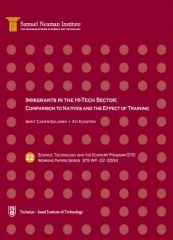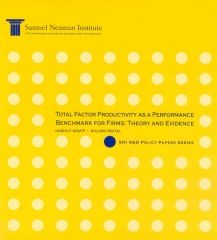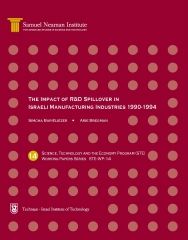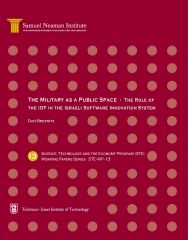Data and Indicators on Aerospace Engineering, ICT and Biotechnology in Israel
The current report presents data and indicators of three fields of knowledge: Aerospace Engineering, ICT (Information and Communications Technologies), and Biotechnology. The Israeli Aerospace engineering review covers the space plans achievements, the main space institutes, the Aerospace engineering faculty at the Technion, bibliometric data, and military, economy and social aspects of the Israeli space plan. […]
Do High-Skill Immigrants Raise Productivity? Evidence from Israeli Manufacturing Firms, 1990-1999 STE-WP-36
During the second part of the 1990s, the Israeli economy experienced a surge in labor productivity and total factor productivity, which was driven primarily by the manufacturing sector. This surge in productivity coincided with the full absorption and integration into the workforce of highly skilled immigrants from the former Soviet Union. The Soviet immigrants were […]
The quality of Israeli academic institutions: what the wages of graduates tell about it?
Higher education in Israel expanded rapidly in the last ten years with the opening of academic colleges. This study examines the return on education, in terms of salaries, of first degree graduates from colleges compared with that of university graduates, controlling for cognitive abilities and socioeconomic characteristics. The use of Propensity Score Matching shows that […]
A Strategy for Developing Employment Opportunities for the Arabs in Israel: The Vision for Expanding the Arab Middle Class

This study analyzes the problems that face the Arab community in Israel in the field of work and employment. It presents a strategy for developing employment opportunities for the Arab minority in Israel. Moreover, the study suggests a new vision for expanding the Arab middle class in Israel by developing equal employment opportunities.
Immigrants in the Hi-Tech Sector: Comparison to Natives and the Effect of Training STE-WP-22-2004

This paper provides a descriptive analysis of the integration of the immigrants from the CIS in the Israeli labor market and, specifically, in the hi-tech sector. The analysis is based on the national cross sectional Labor Force Survey and on a unique panel data that follows Russian engineers for up to twelve years in Israel. […]
Total Factor Productivity as a Performance Benchmark for Firms: Theory and Evidence, SNI R&D Policy Papers Series

We propose using Solow’s macroeconomic approach and the concept of Total Factor Productivity (TFP) as a microeconomic tool for analyzing individual firms. TFP long used in analyzing macroeconomic growth among countries, is a useful strategic performance benchmark for individual firms. TFP calculations permit managers and investors to partition labor productivity growth between two sharplydifferent underlying […]
The Impact of R&D Spillover on Growth and Productivity in Israeli Manufacturing Industries 1990-1994, Science, Technology and the Economy Program (STE) – Working Papers Series STE-WP-14

The study presents the positive external effects (spillovers) of investments in research and development in manufacturing industries, in Israel and abroad. This examination quantifies the spillover of domestic and imported technologies, through intermediates and capital goods, to establishments that did not participate directly in the research and development process. The analysis examines the interactions between […]
The Military as a Public Space – The Role of the IDF in the Israeli Software Innovation System, Science, Technology and the Economy Program (STE) – Working Papers Series STE-WP-13

This paper focuses on the role played by the Israeli military (IDF) in creating and sustaining the highly innovative Israeli software industry. The IDF is often credited with a large role in the creation and sustained success of the Israeli high-tech industry. The paper analyze the activities and history of the IDF’s central computer unit, […]
The Contribution of Technion Graduates to the Israeli Economy

This report shows the contribution of leading Technion graduates to Israel’s economy. The leaders are decision makers with influence on their organizations including chairmen of board of directors, presidents, CEO’s, deputy CEO’s etc. The leaders’ population was taken from a special list prepared by the Technion Alumni Liaison Office and includes 600 graduates. 2% of […]
Trends in Hiring Demands for Professionals by Companies Belonging to the Association of Software Developers in Israel

We are lately witnessing a gap between demand and supply for professionals which might hamper further development of industry. The professional training provided to new immigrants until now did, indeed, supply a considerable number of professionals to industry; this however, is not enough to answer the ever growing demand for more, on the one hand, […]
